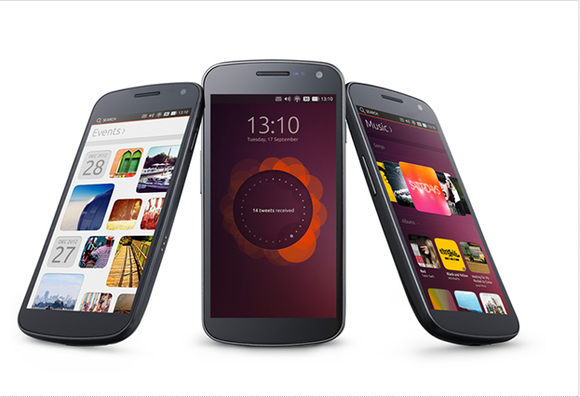
Ubuntu phones on track for 2014 after all
Android and iOS: the ‘tired app icon grid’
Canonical explicitly ruled out some household device-manufacturer names in favor of tactically focused bq and Meizu for its Ubuntu phone launch, Shuttleworth told reporters. However, more familiar manufacturers will join the fold with devices of their own next year, he said.
Initially, “we wanted to work with partners who understand the challenges and have a successful track record entering entrenched markets,” Shuttleworth said.
The focus of Ubuntu phones will be to put content and services at the center of the experience, giving users immediate access to the content they want while offering operators and OEMs a way to differentiate their offerings that goes beyond just theming and icons, Christian Parrino, the company’s vice president for mobile and online services, pointed out.
“The mobile industry has long been looking for a viable alternative to those that reign today,” Shuttleworth explained. “Ubuntu puts the control back into the hands of our partners and presents an exciting platform for consumers, delivering an experience which departs from the tired app icon grid of Android and iOS and provides a fluid, content-rich experience for all.”
With a focus also on HTML5, Canonical seeks to position Ubuntu as “the open alternative to Android,” Shuttleworth said. By the time the first phones launch, Canonical will have converged the Linux-based operating system’s code on both mobile devices and PCs, he added. The company also plans to make it easy to install the OS on Android devices.
‘We’re much better positioned’
Though it won’t be more than vaporware at least until MWC next week, Canonical’s news could have significant ramifications for those of us on the business side.
First, Shuttleworth took pains to say that Canonical’s mobile aspirations won’t take anything away from its enterprise efforts—in fact, one of the potential key launch customers for its mobile initiative is the security department of a “very large government” that uses Ubuntu on cloud and server, Shuttleworth said.
“It’s the same platform and the same security-update mechanisms—that’s a huge asset in the enterprise market,” he explained.
Major carriers such as Vodafone, T-Mobile USA, Deutsche Telekom, and Verizon have all shown their support for Ubuntu, Shuttleworth added.
Meanwhile, elements of the unsuccessfully crowdfunded Ubuntu Edge device have recently gained new traction, he pointed out, such as when Apple “snatched up” the sapphire screen that would have been included and announced that its next mobile CPU would be desktop-class. “Many of the key things we pitched are now starting to happen elsewhere,” he said.
Looking ahead, “we think convergence is the next key disruption to personal computing,” Shuttleworth concluded. “We believe we’re much better positioned to capitalize on a disruption like that than Android or iOS.”




